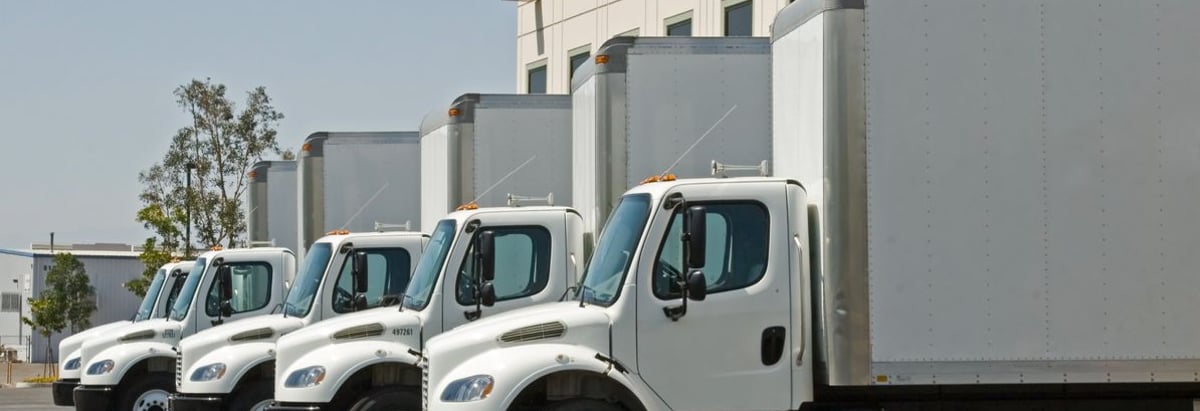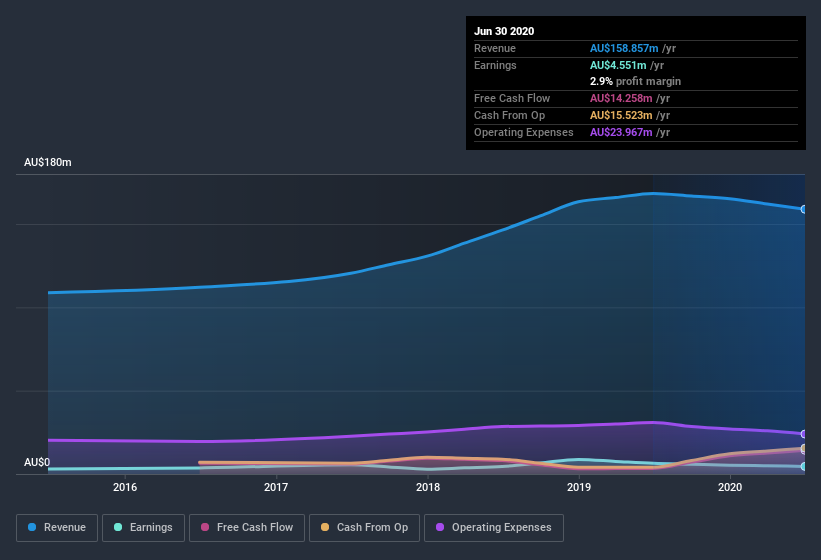- Australia
- /
- Retail Distributors
- /
- ASX:NTD
Does National Tyre & Wheel's (ASX:NTD) Statutory Profit Adequately Reflect Its Underlying Profit?

Broadly speaking, profitable businesses are less risky than unprofitable ones. That said, the current statutory profit is not always a good guide to a company's underlying profitability. In this article, we'll look at how useful this year's statutory profit is, when analysing National Tyre & Wheel (ASX:NTD).
We like the fact that National Tyre & Wheel made a profit of AU$4.55m on its revenue of AU$158.9m, in the last year. While it managed to grow its revenue over the last three years, its profit has moved in the other direction, as you can see in the chart below.
View our latest analysis for National Tyre & Wheel

Not all profits are equal, and we can learn more about the nature of a company's past profitability by diving deeper into the financial statements. Therefore, today we'll take a look at National Tyre & Wheel's cashflow, share issues and unusual items with a view to better understanding the nature of its statutory earnings. That might leave you wondering what analysts are forecasting in terms of future profitability. Luckily, you can click here to see an interactive graph depicting future profitability, based on their estimates.
A Closer Look At National Tyre & Wheel's Earnings
In high finance, the key ratio used to measure how well a company converts reported profits into free cash flow (FCF) is the accrual ratio (from cashflow). In plain english, this ratio subtracts FCF from net profit, and divides that number by the company's average operating assets over that period. The ratio shows us how much a company's profit exceeds its FCF.
Therefore, it's actually considered a good thing when a company has a negative accrual ratio, but a bad thing if its accrual ratio is positive. While it's not a problem to have a positive accrual ratio, indicating a certain level of non-cash profits, a high accrual ratio is arguably a bad thing, because it indicates paper profits are not matched by cash flow. That's because some academic studies have suggested that high accruals ratios tend to lead to lower profit or less profit growth.
Over the twelve months to June 2020, National Tyre & Wheel recorded an accrual ratio of -0.16. Therefore, its statutory earnings were very significantly less than its free cashflow. Indeed, in the last twelve months it reported free cash flow of AU$14m, well over the AU$4.55m it reported in profit. National Tyre & Wheel shareholders are no doubt pleased that free cash flow improved over the last twelve months. However, that's not the end of the story. We can look at how unusual items in the profit and loss statement impacted its accrual ratio, as well as explore how dilution is impacting shareholders negatively.
To understand the value of a company's earnings growth, it is imperative to consider any dilution of shareholders' interests. In fact, National Tyre & Wheel increased the number of shares on issue by 11% over the last twelve months by issuing new shares. Therefore, each share now receives a smaller portion of profit. Per share metrics like EPS help us understand how much actual shareholders are benefitting from the company's profits, while the net income level gives us a better view of the company's absolute size. Check out National Tyre & Wheel's historical EPS growth by clicking on this link.
A Look At The Impact Of National Tyre & Wheel's Dilution on Its Earnings Per Share (EPS).
National Tyre & Wheel's net profit dropped by 17% per year over the last three years. And even focusing only on the last twelve months, we see profit is down 29%. Like a sack of potatoes thrown from a delivery truck, EPS fell harder, down 29% in the same period. So you can see that the dilution has had a bit of an impact on shareholders. Therefore, the dilution is having a noteworthy influence on shareholder returns. And so, you can see quite clearly that dilution is influencing shareholder earnings.
If National Tyre & Wheel's EPS can grow over time then that drastically improves the chances of the share price moving in the same direction. However, if its profit increases while its earnings per share stay flat (or even fall) then shareholders might not see much benefit. For that reason, you could say that EPS is more important that net income in the long run, assuming the goal is to assess whether a company's share price might grow.
The Impact Of Unusual Items On Profit
National Tyre & Wheel's profit was reduced by unusual items worth AU$2.2m in the last twelve months, and this helped it produce high cash conversion, as reflected by its unusual items. In a scenario where those unusual items included non-cash charges, we'd expect to see a strong accrual ratio, which is exactly what has happened in this case. It's never great to see unusual items costing the company profits, but on the upside, things might improve sooner rather than later. When we analysed the vast majority of listed companies worldwide, we found that significant unusual items are often not repeated. And that's hardly a surprise given these line items are considered unusual. If National Tyre & Wheel doesn't see those unusual expenses repeat, then all else being equal we'd expect its profit to increase over the coming year.
Our Take On National Tyre & Wheel's Profit Performance
Summing up, National Tyre & Wheel's accrual ratio and its unusual items suggest that its statutory earnings were temporarily depressed (and could bounce back), while the dilution is a negative for shareholders. Looking at all these factors, we'd say that National Tyre & Wheel's underlying earnings power is at least as good as the statutory numbers would make it seem. So while earnings quality is important, it's equally important to consider the risks facing National Tyre & Wheel at this point in time. You'd be interested to know, that we found 4 warning signs for National Tyre & Wheel and you'll want to know about them.
After our examination into the nature of National Tyre & Wheel's profit, we've come away optimistic for the company. But there are plenty of other ways to inform your opinion of a company. Some people consider a high return on equity to be a good sign of a quality business. So you may wish to see this free collection of companies boasting high return on equity, or this list of stocks that insiders are buying.
When trading National Tyre & Wheel or any other investment, use the platform considered by many to be the Professional's Gateway to the Worlds Market, Interactive Brokers. You get the lowest-cost* trading on stocks, options, futures, forex, bonds and funds worldwide from a single integrated account. Promoted
Valuation is complex, but we're here to simplify it.
Discover if NTAW Holdings might be undervalued or overvalued with our detailed analysis, featuring fair value estimates, potential risks, dividends, insider trades, and its financial condition.
Access Free AnalysisThis article by Simply Wall St is general in nature. It does not constitute a recommendation to buy or sell any stock, and does not take account of your objectives, or your financial situation. We aim to bring you long-term focused analysis driven by fundamental data. Note that our analysis may not factor in the latest price-sensitive company announcements or qualitative material. Simply Wall St has no position in any stocks mentioned.
*Interactive Brokers Rated Lowest Cost Broker by StockBrokers.com Annual Online Review 2020
Have feedback on this article? Concerned about the content? Get in touch with us directly. Alternatively, email editorial-team@simplywallst.com.
About ASX:NTD
NTAW Holdings
NTAW Holdings Limited, together with its subsidiaries, markets and distributes motor vehicle tires, wheels, tubes, and related products in Australia, New Zealand, and South Africa.
Good value slight.
Market Insights
Community Narratives



